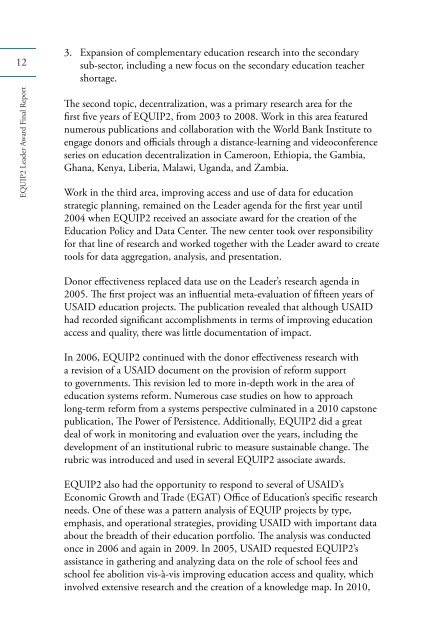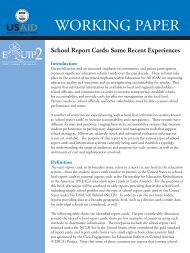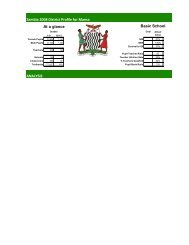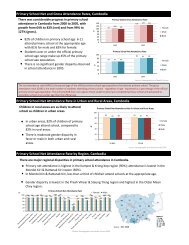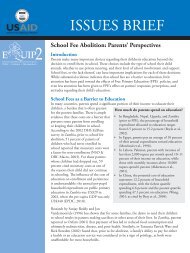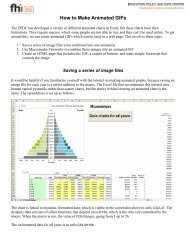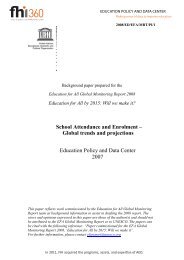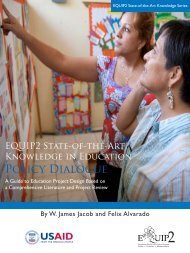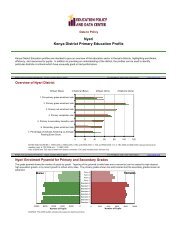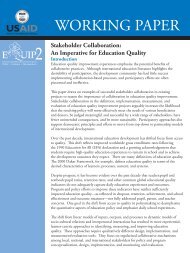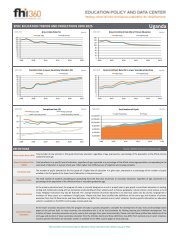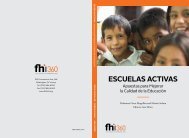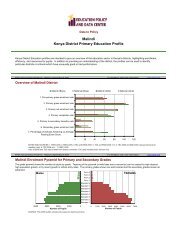EQUIP2 Final Report.pdf - Education Policy Data Center
EQUIP2 Final Report.pdf - Education Policy Data Center
EQUIP2 Final Report.pdf - Education Policy Data Center
You also want an ePaper? Increase the reach of your titles
YUMPU automatically turns print PDFs into web optimized ePapers that Google loves.
12<br />
3. Expansion of complementary education research into the secondary<br />
sub-sector, including a new focus on the secondary education teacher<br />
shortage.<br />
<strong>EQUIP2</strong> Leader Award <strong>Final</strong> <strong>Report</strong><br />
The second topic, decentralization, was a primary research area for the<br />
first five years of <strong>EQUIP2</strong>, from 2003 to 2008. Work in this area featured<br />
numerous publications and collaboration with the World Bank Institute to<br />
engage donors and officials through a distance-learning and videoconference<br />
series on education decentralization in Cameroon, Ethiopia, the Gambia,<br />
Ghana, Kenya, Liberia, Malawi, Uganda, and Zambia.<br />
Work in the third area, improving access and use of data for education<br />
strategic planning, remained on the Leader agenda for the first year until<br />
2004 when <strong>EQUIP2</strong> received an associate award for the creation of the<br />
<strong>Education</strong> <strong>Policy</strong> and <strong>Data</strong> <strong>Center</strong>. The new center took over responsibility<br />
for that line of research and worked together with the Leader award to create<br />
tools for data aggregation, analysis, and presentation.<br />
Donor effectiveness replaced data use on the Leader’s research agenda in<br />
2005. The first project was an influential meta-evaluation of fifteen years of<br />
USAID education projects. The publication revealed that although USAID<br />
had recorded significant accomplishments in terms of improving education<br />
access and quality, there was little documentation of impact.<br />
In 2006, <strong>EQUIP2</strong> continued with the donor effectiveness research with<br />
a revision of a USAID document on the provision of reform support<br />
to governments. This revision led to more in-depth work in the area of<br />
education systems reform. Numerous case studies on how to approach<br />
long-term reform from a systems perspective culminated in a 2010 capstone<br />
publication, The Power of Persistence. Additionally, <strong>EQUIP2</strong> did a great<br />
deal of work in monitoring and evaluation over the years, including the<br />
development of an institutional rubric to measure sustainable change. The<br />
rubric was introduced and used in several <strong>EQUIP2</strong> associate awards.<br />
<strong>EQUIP2</strong> also had the opportunity to respond to several of USAID’s<br />
Economic Growth and Trade (EGAT) Office of <strong>Education</strong>’s specific research<br />
needs. One of these was a pattern analysis of EQUIP projects by type,<br />
emphasis, and operational strategies, providing USAID with important data<br />
about the breadth of their education portfolio. The analysis was conducted<br />
once in 2006 and again in 2009. In 2005, USAID requested <strong>EQUIP2</strong>’s<br />
assistance in gathering and analyzing data on the role of school fees and<br />
school fee abolition vis-à-vis improving education access and quality, which<br />
involved extensive research and the creation of a knowledge map. In 2010,


